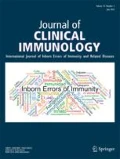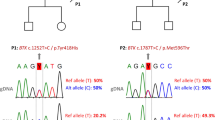Abstract
The DEFI study has collected clinical data and biological specimens from kindreds with CVID. Patients with demonstrated parental consanguinity (cCVID group) were compared to patients without parental consanguinity (ncCVID). A total of 24 of the 436 patients with CVID had consanguineous parents. Age at first symptoms and age at diagnosis were comparable in the two groups. Some complications were more frequent in cCVID patients: splenomegaly (62.5% vs. 29%; p = 0.001), granulomatous disease (29% vs. 12%; p = 0.02), and bronchiectasis (58% vs. 29%; p = 0.003). A high incidence of opportunistic infections was also observed in this population (29% vs. 5%; p < 0.001). Distribution of B-cell subsets were similar in the two groups. Naïve CD4+ T cells were decreased in cCVID patients (15% vs. 28%; p < 0.001), while activated CD4 + CD95+ (88% vs. 74%; p = 0.002) and CD8 + HLA-DR + T cells (47% vs. 31%; p < 0.001) were increased in these patients when compared to ncCVID patients. Parental consanguinity is associated with an increased risk of developing severe clinical complications in patients with CVID. Most of these patients presented with severe T-cell abnormalities and should be considered with a diagnosis of late-onset combined immune deficiency (LOCID). Systematic investigation for parental consanguinity in patients with CVID provides useful information for specific clinical care and genetic screening.

Similar content being viewed by others
Abbreviations
- CVID:
-
Common variable immunodeficiency
- cCVID:
-
Common variable immunodeficiency in patients with consanguineous parents
- ncCVID:
-
Common variable immunodeficiency in patients with non-consanguineous parents
- LOCID:
-
Late-onset combined immune deficiency
- ICOS:
-
Inducible T-cell costimulator
- BAFF-R:
-
B cell-activating factor receptor
- TACI:
-
Transmembrane activator and CAML interactor
- BLNK:
-
B-cell linker
- EBV:
-
Epstein Barr virus
References
Conley ME, Notarangelo LD, Etzioni A. Diagnostic criteria for primary immunodeficiencies. representing PAGID (Pan-American Group for Immunodeficiency) and ESID (European Society for Immunodeficiencies). Clin Immunol. 1999;93(3):190–7.
Cunningham-Rundles C. How I treat common variable immune deficiency. Blood. 2010;116(1):7–15.
Chapel H, Lucas M, Lee M, et al. Common variable immunodeficiency disorders: division into distinct clinical phenotypes. Blood. 2008;112(2):277–86.
Wehr C, Kivioja T, Schmitt C, et al. The EUROclass trial: defining subgroups in common variable immunodeficiency. Blood. 2008;111(1):77–85.
Mouillot G, Carmagnat M, Gérard L, et al. B-cell and T-cell phenotypes in CVID patients correlate with the clinical phenotype of the disease. J Clin Immunol. 2010;30(5):746–55.
Conley ME. Genetics of hypogammaglobulinemia: what do we really know? Curr Opin Immunol. 2009;21(5):466–71.
Grimbacher B, Hutloff A, Schlesier M, et al. Homozygous loss of ICOS is associated with adult-onset common variable immunodeficiency. Nat Immunol. 2003;4(3):261–8.
Salzer U, Maul-Pavicic A, Cunningham-Rundles C, et al. ICOS deficiency in patients with common variable immunodeficiency. Clin Immunol. 2004;113(3):234–40.
van Zelm MC, Reisli I, van der Burg M, et al. An antibody-deficiency syndrome due to mutations in the CD19 gene. N Engl J Med. 2006;354(18):1901–12.
Kanegane H, Agematsu K, Futatani T, et al. Novel mutations in a Japanese patient with CD19 deficiency. Genes Immun. 2007;8(8):663–70.
Vince N, Boutboul D, Mouillot G, et al. Defects in the CD19 complex predispose to glomerulonephritis, as well as IgG1 subclass deficiency. J Allergy Clin Immunol. 2011;127(2):538–41. e1-5.
Kuijpers TW, Bende RJ, Baars PA, et al. CD20 deficiency in humans results in impaired T cell-independent antibody responses. J Clin Invest. 2010;120(1):214–22.
Warnatz K, Salzer U, Rizzi M, et al. B-cell activating factor receptor deficiency is associated with an adult-onset antibody deficiency syndrome in humans. Proc Natl Acad Sci U S A. 2009;106(33):13945–50.
van Zelm MC, Smet J, Adams B, et al. CD81 gene defect in humans disrupts CD19 complex formation and leads to antibody deficiency. J Clin Invest. 2010;120(4):1265–74.
The French national registry of primary immunodeficiency diseases. Clin Immunol. 2010;135(2):264–272.
Malphettes M, Gérard L, Carmagnat M, et al. Late-onset combined immune deficiency: a subset of common variable immunodeficiency with severe T cell defect. Clin Infect Dis. 2009;49(9):1329–38.
Conley ME, Dobbs AK, Farmer DM, et al. Primary B cell immunodeficiencies: comparisons and contrasts. Annu Rev Immunol. 2009;27:199–227.
Rezaei N, Pourpak Z, Aghamohammadi A, et al. Consanguinity in primary immunodeficiency disorders; the report from Iranian Primary Immunodeficiency Registry. Am J Reprod Immunol. 2006;56(2):145–51.
Al-Herz W, Naguib KK, Notarangelo LD, Geha RS, Alwadaani A. Parental consanguinity and the risk of primary immunodeficiency disorders: report from the Kuwait National Primary Immunodeficiency Disorders Registry. Int Arch Allergy Immunol. 2011;154(1):76–80.
Rezaei N, Aghamohammadi A, Moin M, et al. Frequency and clinical manifestations of patients with primary immunodeficiency disorders in Iran: update from the Iranian Primary Immunodeficiency Registry. J Clin Immunol. 2006;26(6):519–32.
Aghamohammadi A, Abolhassani H, Moazzami K, Parvaneh N, Rezaei N. Correlation between common variable immunodeficiency clinical phenotypes and parental consanguinity in children and adults. J Investig Allergol Clin Immunol. 2010;20(5):372–9.
Oksenhendler E, Gérard L, Fieschi C, et al. Infections in 252 patients with common variable immunodeficiency. Clin Infect Dis. 2008;46(10):1547–54.
Giovannetti A, Pierdominici M, Mazzetta F, et al. Unravelling the complexity of T cell abnormalities in common variable immunodeficiency. J Immunol. 2007;178(6):3932–43.
Eibel H, Salzer U, Warnatz K. Common variable immunodeficiency at the end of a prospering decade: towards novel gene defects and beyond. Curr Opin Allergy Clin Immunol. 2010;10(6):526–33.
Salzer U, Bacchelli C, Buckridge S, et al. Relevance of biallelic versus monoallelic TNFRSF13B mutations in distinguishing disease-causing from risk-increasing TNFRSF13B variants in antibody deficiency syndromes. Blood. 2009;113(9):1967–76.
Chapel H, Cunningham-Rundles C. Update in understanding common variable immunodeficiency disorders (CVIDs) and the management of patients with these conditions. Br J Haematol. 2009;145(6):709–27.
Schaffer FM, Palermos J, Zhu ZB, et al. Individuals with IgA deficiency and common variable immunodeficiency share polymorphisms of major histocompatibility complex class III genes. Proc Natl Acad Sci U S A. 1989;86(20):8015–9.
Sekine H, Ferreira RC, Pan-Hammarström Q, et al. Role for Msh5 in the regulation of Ig class switch recombination. Proc Natl Acad Sci U S A. 2007;104(17):7193–8.
Acknowledgments
The DEFI study was supported by a national program for clinical research (PHRC 2005) and by the National Center on Hereditary Immune Deficiencies (CEREDIH), by Laboratoire Français du Fractionnement et des Biotechnologies (LFB), Baxter BioScience, and CSL Behring.
Author information
Authors and Affiliations
Consortia
Corresponding author
Appendix
Appendix
DEFI study group
-
Coordination: E. Oksenhendler, Hôpital Saint Louis, Paris
-
Clinical Centers: Hôpital Saint Louis, Paris: C. Fieschi, M. Malphettes, L. Galicier, D. Boutboul, J.P. Fermand. Bordeaux: J.F. Viallard. Limoges: A. Jaccard. Tours: C. Hoarau, Y. Lebranchu. Hôpital Cochin, Paris: A. Bérezné, L. Mouthon. HEGP, Paris: M. Karmochkine, S. Georgin-Lavialle. Marseille: N. Schleinitz. Lyon Sud: I. Durieu, R. Nove-Josserand. Clermont-Ferrand: V. Chanet. Montpellier: V. Le-Moing. Roubaix: N. Just. Hôtel-Dieu, Paris: C. Salanoubat. Reims: R. Jaussaud. Hôpital Necker, Paris: F. Suarez, O. Hermine. Le Mans: P. Solal-Celigny. Lille: E. Hachulla. Perpignan: L. Sanhes. Angers: M. Gardembas, I. Pellier. Troyes: P. Tisserant. Lyon Armée: M. Pavic. Dijon: B. Bonnotte. Pitié-Salpêtrière, Paris: J. Haroche, Z. Amoura. Toulouse: L. Alric, M.F. Thiercelin, L. Tetu, D. Adoue. Nancy Vandoeuvre: P. Bordigoni. Lyon Croix Rousse: T. Perpoint. Lyon Hotel-Dieu: P. Sève. Besançon: P. Rohrlich. Strasbourg: J.L. Pasquali, P. Soulas. Hôpital Foch, Suresnes: L.J. Couderc, E. Catherinot. Montauban: P. Giraud. Hôpital Saint-Louis, Pédiatrie, Paris: A. Baruchel. Clermont-Ferrand 2: I. Deleveau. Kremlin-Bicêtre: F. Chaix. Hôpital Trousseau, Paris: J. Donadieu. Rouen: F. Tron. Bobigny: C. Larroche. Aix: AP Blanc. Nantes: A. Masseau, M. Hamidou. Nancy: G. Kanny, M. Morisset. Poitiers: F. Millot. Bondy: O. Fain. Hôpital Bichat, Paris: R. Borie. Rennes: A. Perlat. Clamart: V. Martinez. Caen: B. Bienvenu.
-
Labs
Pitié-Salpêtrière, INSERM U543, Paris: P. Debré, G. Mouillot, I. Théodorou.
Saint-Louis, Immunologie, Paris: C. Rabian, M. Carmagnat.
Saint-Louis, EA 3963, Paris: C. Fieschi, M. Malphettes, N. Vince, D. Boutboul
-
Data Management and Statistics: L. Gérard.
Rights and permissions
About this article
Cite this article
Rivoisy, C., Gérard, L., Boutboul, D. et al. Parental Consanguinity is Associated with a Severe Phenotype in Common Variable Immunodeficiency. J Clin Immunol 32, 98–105 (2012). https://doi.org/10.1007/s10875-011-9604-9
Received:
Accepted:
Published:
Issue Date:
DOI: https://doi.org/10.1007/s10875-011-9604-9




